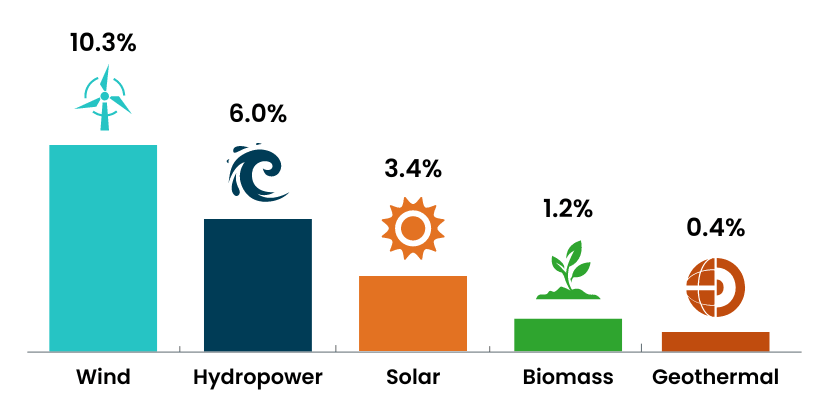Explore the rising popularity of renewable energy in 2024. Learn about the latest trends, technological advancements, and the global shift towards sustainable energy solutions.
Introduction
As concerns about climate change and environmental sustainability continue to grow, the popularity of renewable energy has soared. In 2024, renewable energy sources like solar, wind, and hydroelectric power are at the forefront of global energy strategies. This article explores the factors driving the increased adoption of renewable energy, the latest technological advancements, and the benefits of a sustainable energy future.
1. The Growing Demand for Clean Energy
The demand for clean, renewable energy has never been higher. Several factors contribute to this trend:
- Climate Change Awareness: Increased awareness of climate change and its impacts has led to a greater demand for sustainable energy solutions. Learn more about climate change
- Government Policies: Many governments worldwide are implementing policies and incentives to promote the adoption of renewable energy. Explore global renewable energy policies
- Corporate Responsibility: Businesses are increasingly committing to sustainability goals, driving the adoption of renewable energy. Read about corporate sustainability
2. Technological Advancements in Renewable Energy
Technological advancements are making renewable energy more efficient and affordable. Key developments include:
- Solar Power: Innovations in solar panel technology, such as higher efficiency rates and lower production costs, are making solar power more accessible. Discover the latest in solar technology
- Wind Energy: Advances in wind turbine design and offshore wind farms are increasing the capacity and reliability of wind energy. Find out more about wind energy
- Energy Storage: Breakthroughs in battery storage technology are addressing the intermittency of renewable energy sources, ensuring a stable energy supply. Learn about energy storage

3. The Economic Benefits of Renewable Energy
Renewable energy offers significant economic benefits that contribute to its popularity:
- Job Creation: The renewable energy sector is creating jobs in manufacturing, installation, and maintenance, boosting local economies. Read about renewable energy job growth
- Energy Independence: By investing in local renewable energy sources, countries can reduce their dependence on imported fossil fuels. Explore energy independence benefits
- Cost Savings: As the cost of renewable energy continues to decrease, consumers and businesses can save on energy bills. See renewable energy cost trends
4. Global Initiatives and Agreements
International cooperation and agreements are crucial to the global shift towards renewable energy:
- Paris Agreement: The Paris Agreement continues to drive global efforts to reduce carbon emissions and transition to renewable energy. Learn about the Paris Agreement
- COP Conferences: Annual COP (Conference of the Parties) meetings bring countries together to discuss and enhance climate action, including renewable energy adoption. Explore COP conferences
- Renewable Energy Targets: Many countries are setting ambitious renewable energy targets, aiming for significant percentages of their energy mix to come from renewables by 2030 and beyond. Read about renewable energy targets

5. The Role of Innovation in Driving Popularity
Innovation plays a key role in the growing popularity of renewable energy. Notable innovations include:
- Smart Grids: Smart grid technology is improving the efficiency and reliability of energy distribution, integrating renewable energy sources seamlessly. Find out about smart grids
- Microgrids: Microgrids provide localized energy solutions, enhancing energy security and resilience, especially in remote areas. Learn about microgrids
- Hydrogen Energy: Green hydrogen, produced using renewable energy, is emerging as a versatile and clean energy carrier for various applications. Explore hydrogen energy
6. Challenges and Opportunities
While the popularity of renewable energy is rising, there are challenges to address:
- Infrastructure Development: Expanding and modernizing infrastructure to support renewable energy is essential. Read about renewable energy infrastructure
- Financing: Securing financing for large-scale renewable energy projects can be challenging but offers significant investment opportunities. Learn about renewable energy financing
- Public Acceptance: Ensuring public support and addressing concerns related to renewable energy installations, such as land use and aesthetics, is important. Explore public acceptance issues
Conclusion
In 2024, renewable energy is more popular than ever, driven by technological advancements, economic benefits, and a global commitment to sustainability. As the world continues to embrace clean energy solutions, the future looks bright for renewable energy. By overcoming challenges and seizing opportunities, we can pave the way for a sustainable, resilient, and prosperous future.
Interested in staying updated on the latest renewable energy trends? Subscribe to our newsletter for expert insights and updates!


